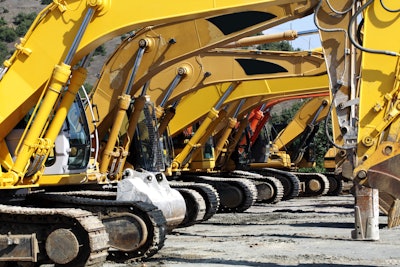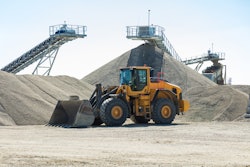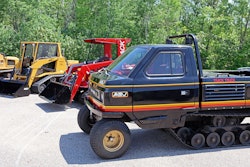
Imagine this scenario: You find a great deal on a used backhoe that another company is selling (let’s call them Company X). You go see it, give it the once over, and it’s perfect for your needs. Everything looks fine, and Company X has owned it free and clear for eight years. You go ahead and buy it.
Several months later, you are contacted by Company X’s bank. It seems Company X has defaulted on some of their loans. The bank claims that the backhoe you bought, despite being owned by Company X at the time of sale, was still part of a blanket lien, and the bank is claiming ownership. You call your lawyer, and after a few (billable) hours, you find out that this is not only true but that the law also backs the bank’s claim.
The end result: despite paying for it, having a receipt, registering and insuring it, and using it for months, you lose the backhoe. And even worse, you also lose the money you paid for it, unless you think the defaulted-on-their-loan Company X will make you whole. Don’t hold your breath.
This story isn’t meant to frighten you off buying used equipment. The scenario just outlined is rare, but all buyers should be aware of it when purchasing used equipment, especially when the seller is not an authorized dealer or reseller. As an equipment lender, we’ve witnessed this happening several times over the years, so it is something used equipment buyers should be educated on.
Does Your Used Equipment Have a Lien?
Obviously, you don’t want to buy any used equipment with a lien on it. But how do you know if there’s a lien or not? Besides taking the buyer’s word for it and perhaps seeing payoff documentation, uncovering liens is generally done with a UCC search, which should turn up most liens (please note the use of the words “should” and “most” there).
But who conducts this UCC search? It can vary. If you are buying your equipment from an authorized dealer or reseller, it may already be done, as most authorized resellers will typically conduct a UCC search before acquiring the equipment in the first place. If you are financing the used equipment, your lender may conduct one as well. And some private sellers may have run one to demonstrate that the equipment’s title is clean. And if none of the preceding has happened, for your own peace of mind, you (the buyer) should definitely be conducting one yourself.
Does a UCC Search Guarantee a Lien-Free Title?
While a UCC search can go a long way in uncovering issues, it is not foolproof. I must be clear in this article: there is nothing that can 100% guarantee a lien-free title on any piece of used equipment. Please keep this in mind when buying.
There are several reasons for this non-guarantee. One reason is the paper trail can be incomplete, especially if the piece of equipment has changed hands multiple times. Another reason is the enormous number of variables in UCC searches, such as the location/jurisdiction searched, company names being similar, complicated serial numbers being entered manually, etc. In other words, there’s a lot of room for clerical error.
But the biggest reason is blanket liens imposed by banks.
Let’s Talk About Blanket Liens
A blanket lien is a lien put on an entire company and all its assets. If a business finances a piece of equipment through the bank, all of their tangible assets, even assets they’ve owned free and clear for years, now have a blanket lien on them. This includes our backhoe at the beginning of this story. Technically, that backhoe (or any other asset the company owns) cannot be sold without the bank’s permission.
The trouble with this is the blanket lien is a standard bank clause buried in the fine print, so it becomes “out of sight, out of mind” and is easily overlooked. It’s common for a company to think, “Oh, I paid that backhoe off years ago – see, here’s the loan payoff paperwork. There’s no lien on it.”
Right now, if your company has an open bank loan, it’s very likely every asset company owns is part of a blanket lien. Were you aware of that? Don’t worry if you’re not; most business owners aren’t.
Note: everything mentioned can be true for all previous owners. Maybe the blanket lien is from several owners ago. It’s still just as valid. If one of those old owners defaults on a loan, their bank may come looking for assets covered by their blanket lien and follow the trail forward until it reaches the current owner…
How Can a Company Protect Themselves?
There are steps a buying company can take to better shield themselves against accidentally buying used equipment with a lien.
The first is to buy from an authorized reseller or dealer. As stated earlier, most resellers will conduct a preliminary UCC search. And more importantly, most will also stand behind the equipment sold. If an issue does arise, authorized resellers will typically reimburse the buyer if an unforeseen title issue comes up (note: be sure to ask about this when buying.)
That stated, buying from a dealer isn’t always possible. Thousands of pieces of used business equipment are sold by non-dealer private sellers annually. So how do you better protect yourself when buying from a private seller?
The first thing is to make sure a UCC search is conducted. Even if the buyer must do this, it should be done.
The second is to have a complete “buying and selling” paper trail that goes all the way back to the manufacturer. I would personally pass on any piece of used equipment with a broken paper trail. On this aspect, buying used equipment from the original owner makes the paper trail a lot easier.
The third is simply trust. You will have to trust the seller’s word and the UCC results you see.
Wrapping Up
Used equipment sales are very common, and an overwhelming majority of them, even from private sellers, are conducted with no issues. Having a thorough UCC search, a complete paper trail, and buying from a seller you trust all go a long way to alleviate possible issues.
However, always remember it is the buyer who is ultimately affected by any issues. They are the ones that will lose the equipment if there is a lien claim and also lose the money they paid (or still owe the lender if financed.)
In the end, used equipment can be a great value, but please make sure you are 100% comfortable with both the seller and the parameters of the deal.
---
 Dan Furman, Crest CapitalDan Furman
Dan Furman, Crest CapitalDan Furman
All views expressed in this article are those of the author and do not necessarily represent the policy or position of Crest Capital and its affiliates. These views are also opinions – always speak to your accountant or tax professional before engaging in any purchase, financial contract, or tax matter.










